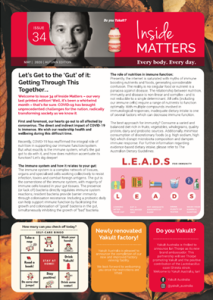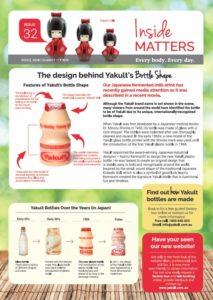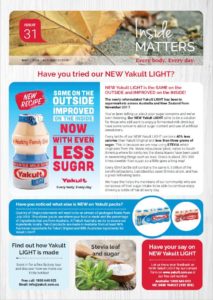Nutrition & Lifestyle
Good Food & Nutrition
Fibre assists the digestive system by adding bulk and allowing digested foods to pass through the gut smoothly.
A well-balanced diet is vital to achieve a healthy mind and body.
What we eat has a major influence on our intestinal microbiota. Changes in our diet, such as those associated with travelling, can also upset this balance. Here are some ideas to keep your digestive system happy.
It is easy to find ways to get some extra fruit and vegetables in your day. Start by aiming for 5 serves of vegetables and 2 serves of fruit each day. Aim to eat a rainbow, as the different colours can provide a variety of vitamins and minerals that our bodies need.
Fruits make an easy and convenient snack that works well as a dessert option too. Whole fruits are preferable to juice, as it has a higher fibre content. Try to choose fruits and vegetables that are in season where possible.

Fibre keeps the digestive system healthy by adding bulk, allowing digested foods to pass through the gut smoothly. A lack of fibre can cause digestive issues such as constipation. Unfortunately, most Australians do not consume sufficient fibre in their diet. Want to increase your fibre intake?
- Opt for wholegrain varieties when choosing breads or cereals.
- Eat your fruit with the skins on, because that’s where the fibre is.
- Include legumes, lentils and beans to your diet.
It is generally advised to increase fibre intake gradually and to drink plenty of fluid to avoid any abdominal discomfort which can result when making a sudden switch from a low-fibre diet to one that is high in fibre.
Fluid is essential for the digestion and absorption of nutrients from the foods we eat, but it also plays an important role in helping to transport waste materials out of our body. While water is the best hydration fluid of choice, fluids also include tea, coffee, milk, cordial, fruit juices and soup.

A balanced intestinal microbiota is important for the digestive system. Including prebiotic and probiotics in your diet can help keep your intestinal microbiota happy.
Probiotics are foods containing live beneficial bacteria that, when consumed, will reach the intestines alive, where the bacteria are capable of favourably altering the balance of bacteria in the digestive system.
Click here to learn more about probiotics.
Prebiotics are different from probiotics. Prebiotics are a form of dietary fibre that help feed and encourage the growth of beneficial bacteria (probiotics) in the digestive system. Examples of foods containing prebiotic are onions, garlic, asparagus and artichokes.
Antibiotics are often given to treat infections caused by harmful bacteria. While antibiotics fight off the harmful bacteria, they are non-specific and may also destroy some of the beneficial bacteria in your digestive system. This can upset the balance, which sometimes cause symptoms such as diarrhoea, wind and bloating.

Lifestyle
Good food is only one part of the equation.
Lifestyle choices can also affect our digestive system. With a few tips, you too can positively influence your digestive system, body and your mind.
Physical activity and exercise can affect the digestive system in various ways. Not only is exercise great for keeping your heart healthy and your muscles toned, regular physical activity can help stimulate regular bowel movement, helping to reduce constipation and bloating.

As we age, our body’s natural defences against infections and harmful bacteria decrease. The balance of good vs. bad bacteria in our digestive tract tends to change towards an increase in the number of potentially harmful bacteria. Our immune system is also thought to be closely associated to our digestive system. It makes sense to care for both, by maintaining good habits such as eating well and staying active right through to old age.
While stress is a common part of everyday life, prolonged high levels of stress can upset the natural balance of our digestive microbiota. Research is beginning to uncover that our brain and our gut are more closely connected than previously thought, just think of the butterflies in your stomach, the sensation you feel when you are nervous or stressed. Try to reduce your stress levels by regularly (actively) taking time out to relax and unwind.

Inside Matters
Yakult Australia’s biannual newsletter, Inside Matters, is produced for our followers to keep up-to-date with the latest news about what’s happening at our Dandenong factory and information on Yakult and probiotics.
Want to find out more? Join our emailing list for an electronic copy of Inside Matters today!








